
lib_resume_builder_AIHawk
None
Stars: 90
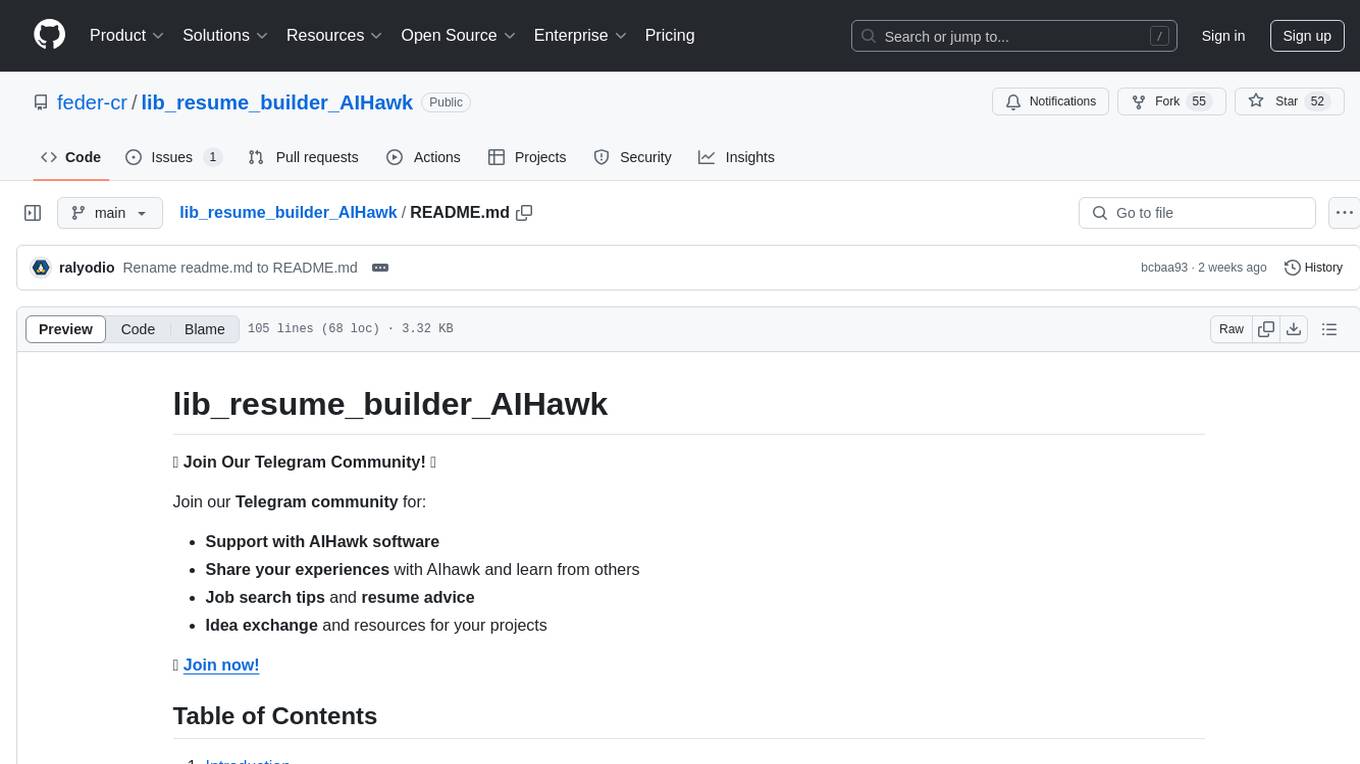
`lib_resume_builder_AIHawk` is a Python library that simplifies the creation of personalized, professional resumes by integrating with GPT models. It allows users to generate tailored resumes based on job descriptions with various styles, offering a flexible approach to resume building with minimal effort.
README:
🚀 Join Our Telegram Community! 🚀
Join our Telegram community for:
- Support with AIHawk software
- Share your experiences with AIhawk and learn from others
- Job search tips and resume advice
- Idea exchange and resources for your projects
- Introduction
- Features
- Usage
- Dependencies
- Documentation
- Troubleshooting
- How to Contribute
- License
- Disclaimer
lib_resume_builder_AIHawk is a Python lib designed to simplify the creation of personalized, professional resumes. By integrating with GPT models, this library allows you to generate resumes that are tailored to specific job descriptions and formatted in various styles. It provides a flexible approach to resume building with minimal effort.
- Dynamic Resume Styling: Use different pre-defined styles to create visually appealing resumes.
- Job Description Integration: Customize resumes based on job description URLs.
- Flexible Configuration: Set up resume details using YAML configuration files.
- Interactive CLI: Easily generate resumes via an interactive command-line interface.
lib_resume_builder_AIHawk requires the following Python packages:
langchainlangchain-communitylangchain-corelangchain-openailangchain-text-splitterslangsmithopenairegex==2024.7.24selenium==4.9.1webdriver-manager==4.0.2inquirerfaiss-cpu
Here’s a detailed documentation for each module in the lib_resume_builder_AIHawk library:
(TODO) (:
For issues, open an issue on GitHub or join our Telegram community for support. 📲 Join now!
- feder-cr - Creator and Lead Developer
We welcome contributions to lib_resume_builder_AIHawk! Whether you are a designer, prompt engineer, software engineer, or have other skills, here’s how you can help:
Enhance resume templates with improved visual design. Learn more.
Help refine prompts for better resume customization. Learn more.
Submit pull requests to improve functionality or fix bugs. Learn more.
You can also contribute by:
- Reporting issues
- Suggesting new features
- Improving documentation
This project is licensed under the MIT License - see the LICENSE file for details.
lib_resume_builder_AIHawk is designed to assist with resume creation. While it aims to be helpful, the service may not cover all specific requirements for every job application. We assume no responsibility for the quality or accuracy of the generated resumes.
For Tasks:
Click tags to check more tools for each tasksFor Jobs:
Alternative AI tools for lib_resume_builder_AIHawk
Similar Open Source Tools

lib_resume_builder_AIHawk
`lib_resume_builder_AIHawk` is a Python library that simplifies the creation of personalized, professional resumes by integrating with GPT models. It allows users to generate tailored resumes based on job descriptions with various styles, offering a flexible approach to resume building with minimal effort.
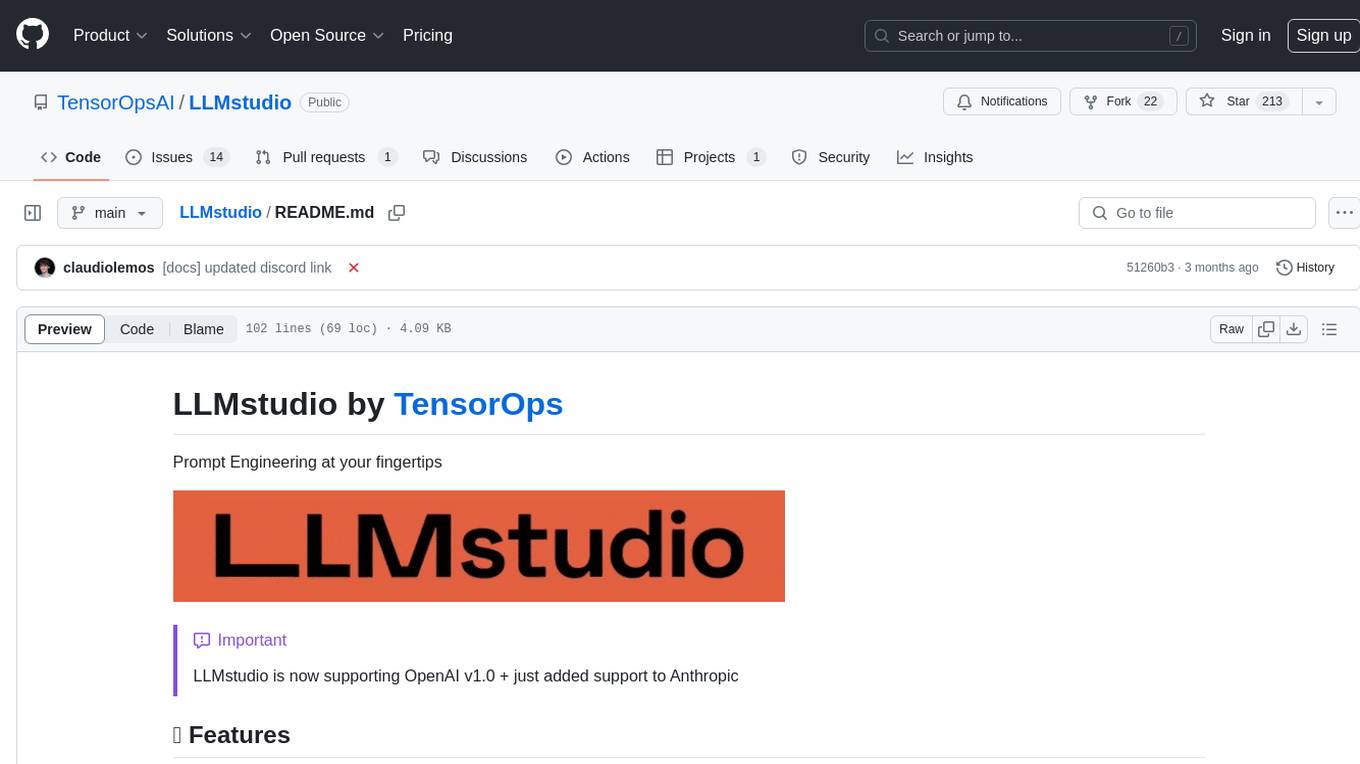
LLMstudio
LLMstudio by TensorOps is a platform that offers prompt engineering tools for accessing models from providers like OpenAI, VertexAI, and Bedrock. It provides features such as Python Client Gateway, Prompt Editing UI, History Management, and Context Limit Adaptability. Users can track past runs, log costs and latency, and export history to CSV. The tool also supports automatic switching to larger-context models when needed. Coming soon features include side-by-side comparison of LLMs, automated testing, API key administration, project organization, and resilience against rate limits. LLMstudio aims to streamline prompt engineering, provide execution history tracking, and enable effortless data export, offering an evolving environment for teams to experiment with advanced language models.

langmanus
LangManus is a community-driven AI automation framework that combines language models with specialized tools for tasks like web search, crawling, and Python code execution. It implements a hierarchical multi-agent system with agents like Coordinator, Planner, Supervisor, Researcher, Coder, Browser, and Reporter. The framework supports LLM integration, search and retrieval tools, Python integration, workflow management, and visualization. LangManus aims to give back to the open-source community and welcomes contributions in various forms.
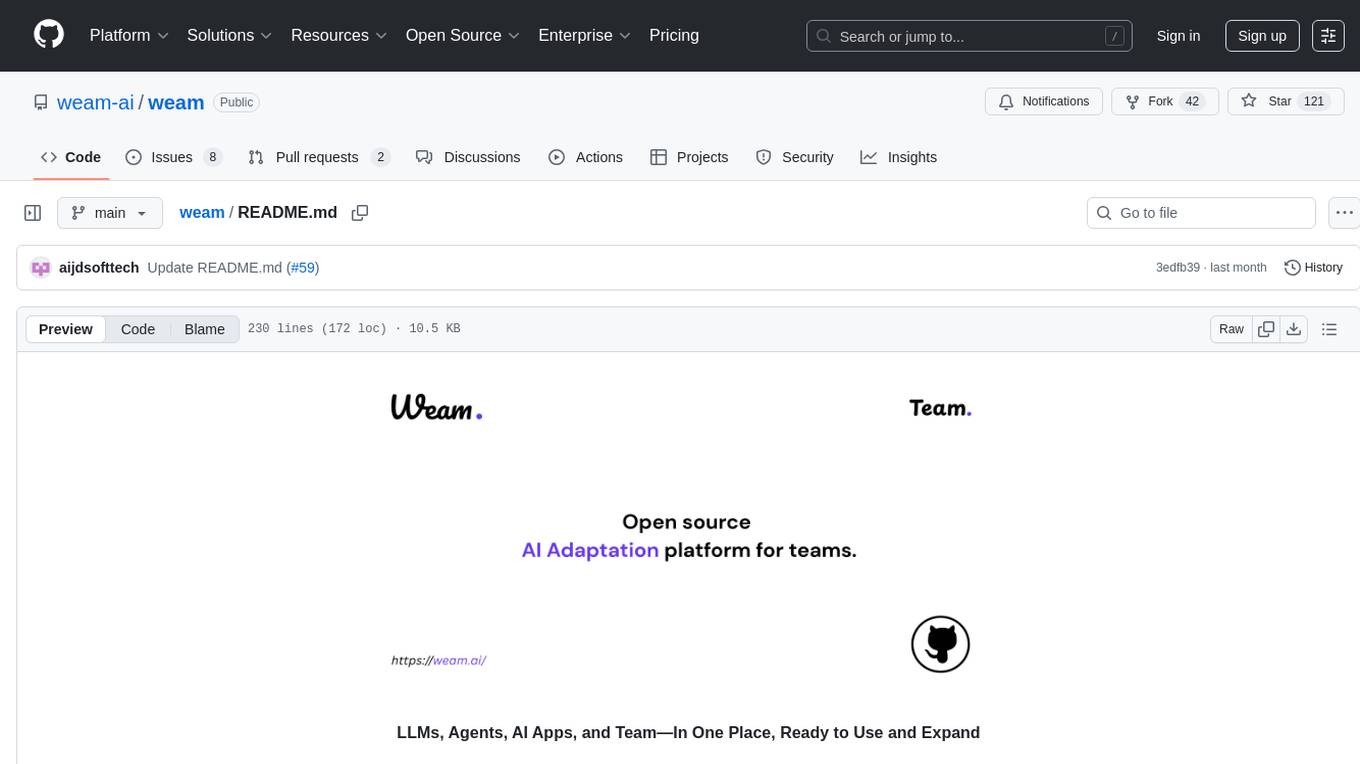
weam
Weam is an open source platform designed to help teams systematically adopt AI. It provides a production-ready stack with Next.js frontend and Node.js/Python backend, allowing for immediate deployment and use. Weam connects to major LLM providers, enabling easy access to the latest AI models. The platform organizes AI interactions into 'Brains' for different departments, offering customization and expansion options. Features include chat system, productivity tools, sharing & access controls, prompt library, AI agents, RAG, MCP, enterprise features, pre-built automations, and upcoming AI app solutions. Weam is free, open source, and scalable to meet growing needs.
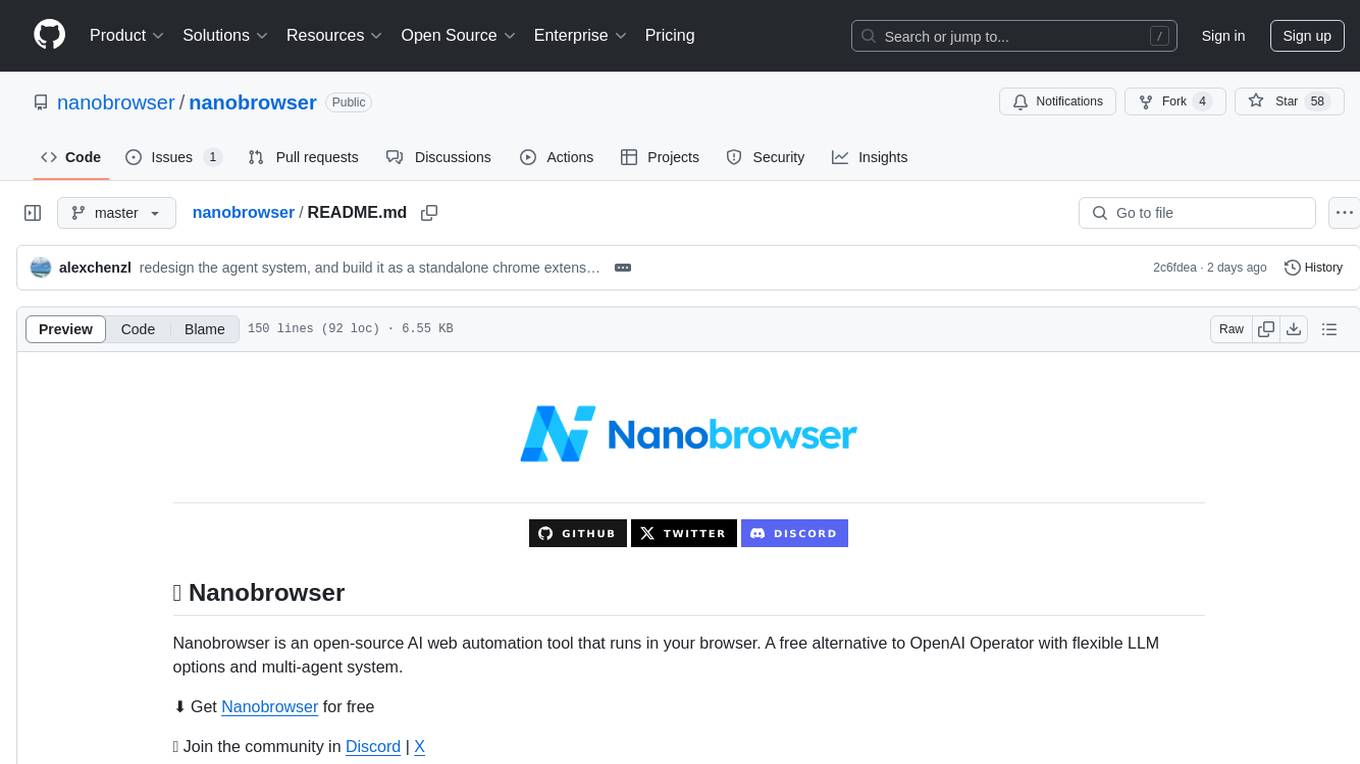
nanobrowser
Nanobrowser is an open-source AI web automation tool that runs in your browser. It is a free alternative to OpenAI Operator with flexible LLM options and a multi-agent system. Nanobrowser offers premium web automation capabilities while keeping users in complete control, with features like a multi-agent system, interactive side panel, task automation, follow-up questions, and multiple LLM support. Users can easily download and install Nanobrowser as a Chrome extension, configure agent models, and accomplish tasks such as news summary, GitHub research, and shopping research with just a sentence. The tool uses a specialized multi-agent system powered by large language models to understand and execute complex web tasks. Nanobrowser is actively developed with plans to expand LLM support, implement security measures, optimize memory usage, enable session replay, and develop specialized agents for domain-specific tasks. Contributions from the community are welcome to improve Nanobrowser and build the future of web automation.
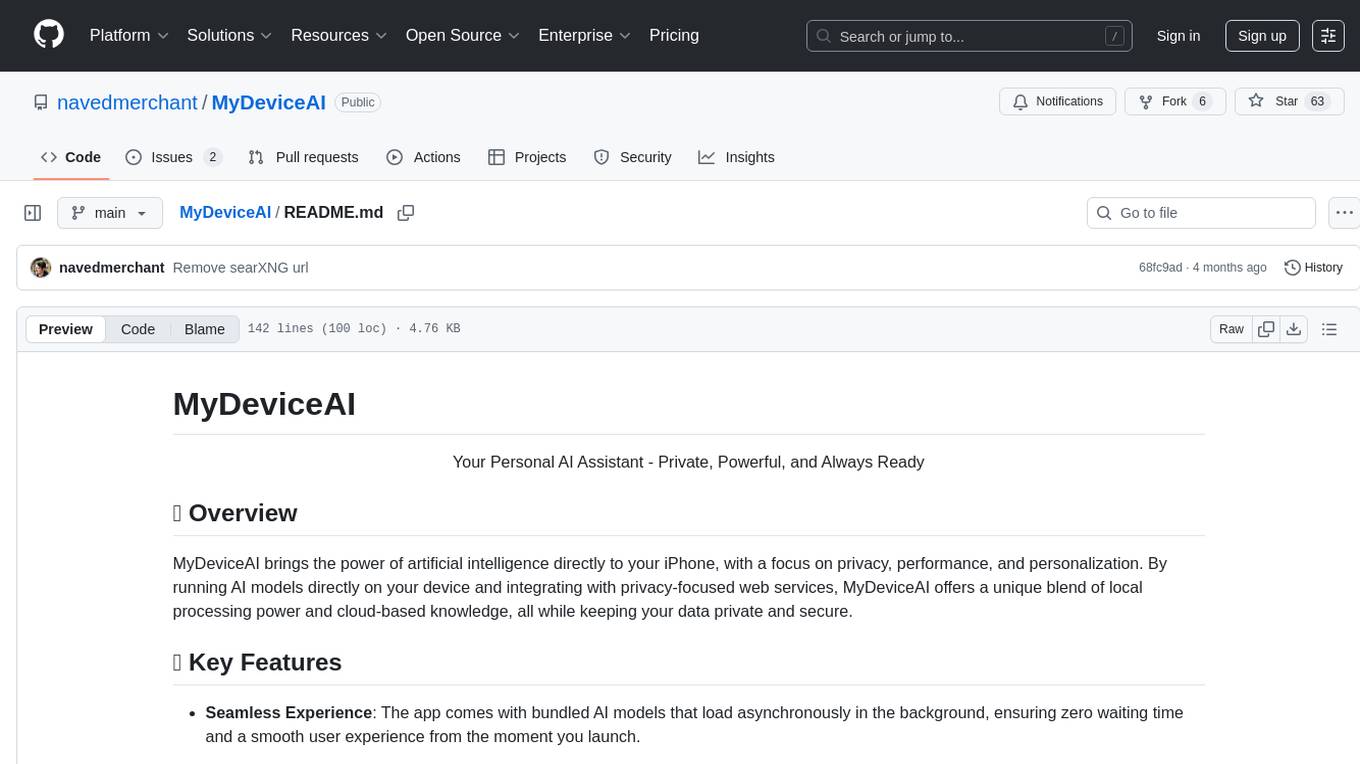
MyDeviceAI
MyDeviceAI is a personal AI assistant app for iPhone that brings the power of artificial intelligence directly to the device. It focuses on privacy, performance, and personalization by running AI models locally and integrating with privacy-focused web services. The app offers seamless user experience, web search integration, advanced reasoning capabilities, personalization features, chat history access, and broad device support. It requires macOS, Xcode, CocoaPods, Node.js, and a React Native development environment for installation. The technical stack includes React Native framework, AI models like Qwen 3 and BGE Small, SearXNG integration, Redux for state management, AsyncStorage for storage, Lucide for UI components, and tools like ESLint and Prettier for code quality.
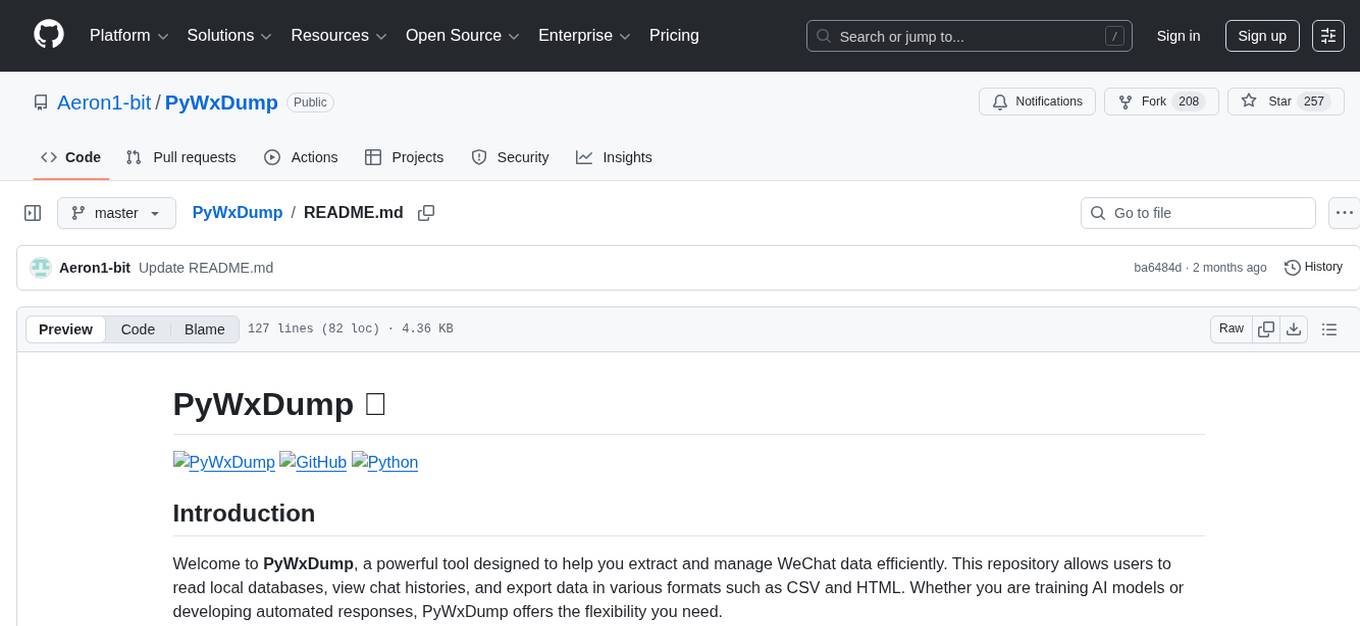
PyWxDump
PyWxDump is a powerful tool designed to help extract and manage WeChat data efficiently. It allows users to read local databases, view chat histories, and export data in various formats such as CSV and HTML. With features like multi-account support, version compatibility, data export, AI training, and automated responses, PyWxDump offers flexibility for training AI models and developing automated replies.
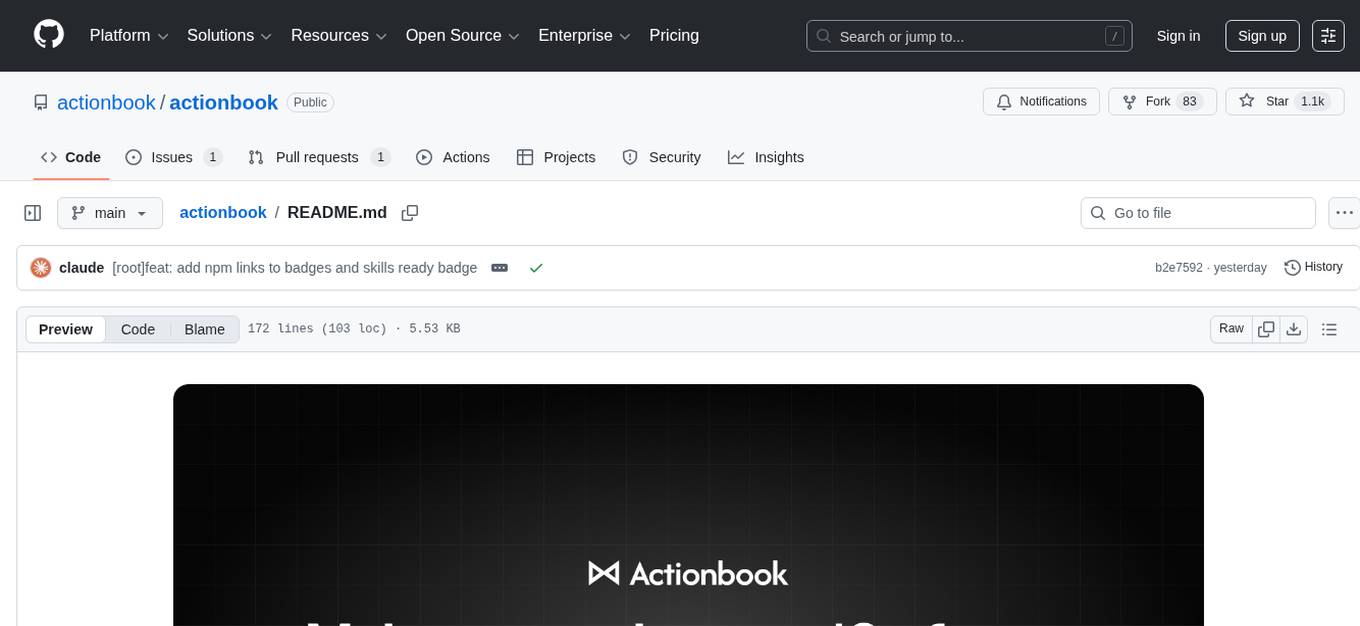
actionbook
Actionbook is a browser action engine designed for AI agents, providing up-to-date action manuals and DOM structure to enable instant website operations without guesswork. It offers faster execution, token savings, resilient automation, and universal compatibility, making it ideal for building reliable browser agents. Actionbook integrates seamlessly with AI coding assistants and offers three integration methods: CLI, MCP Server, and JavaScript SDK. The tool is well-documented and actively developed in a monorepo setup using pnpm workspaces and Turborepo.

TaskingAI
TaskingAI brings Firebase's simplicity to **AI-native app development**. The platform enables the creation of GPTs-like multi-tenant applications using a wide range of LLMs from various providers. It features distinct, modular functions such as Inference, Retrieval, Assistant, and Tool, seamlessly integrated to enhance the development process. TaskingAI’s cohesive design ensures an efficient, intelligent, and user-friendly experience in AI application development.
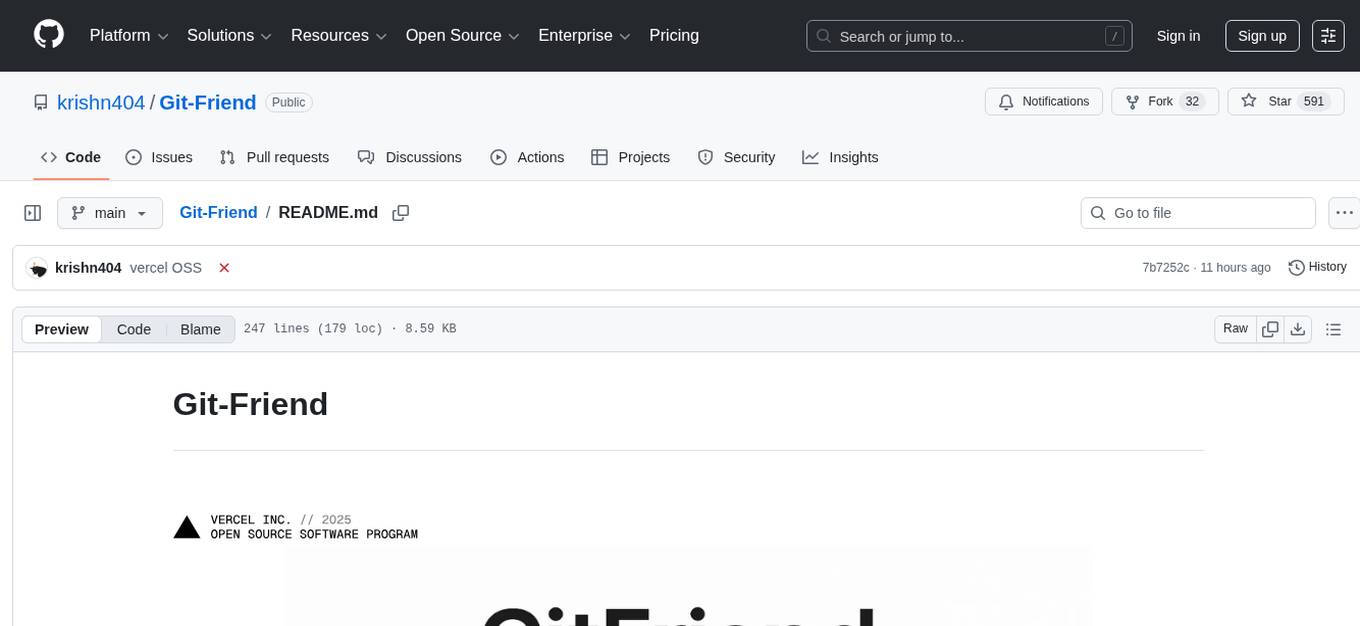
Git-Friend
GitFriend is an AI-powered GitHub assistant tool designed to enhance your GitHub experience by offering features like AI Chat for GitHub Help, Dynamic README Generation, and Commit Emojis. It simplifies GitHub workflows, saves time, and improves productivity for developers, project managers, and beginners. The tool is built with React, TypeScript, and AI technology, providing a user-friendly interface and various powerful tools to streamline repository management.
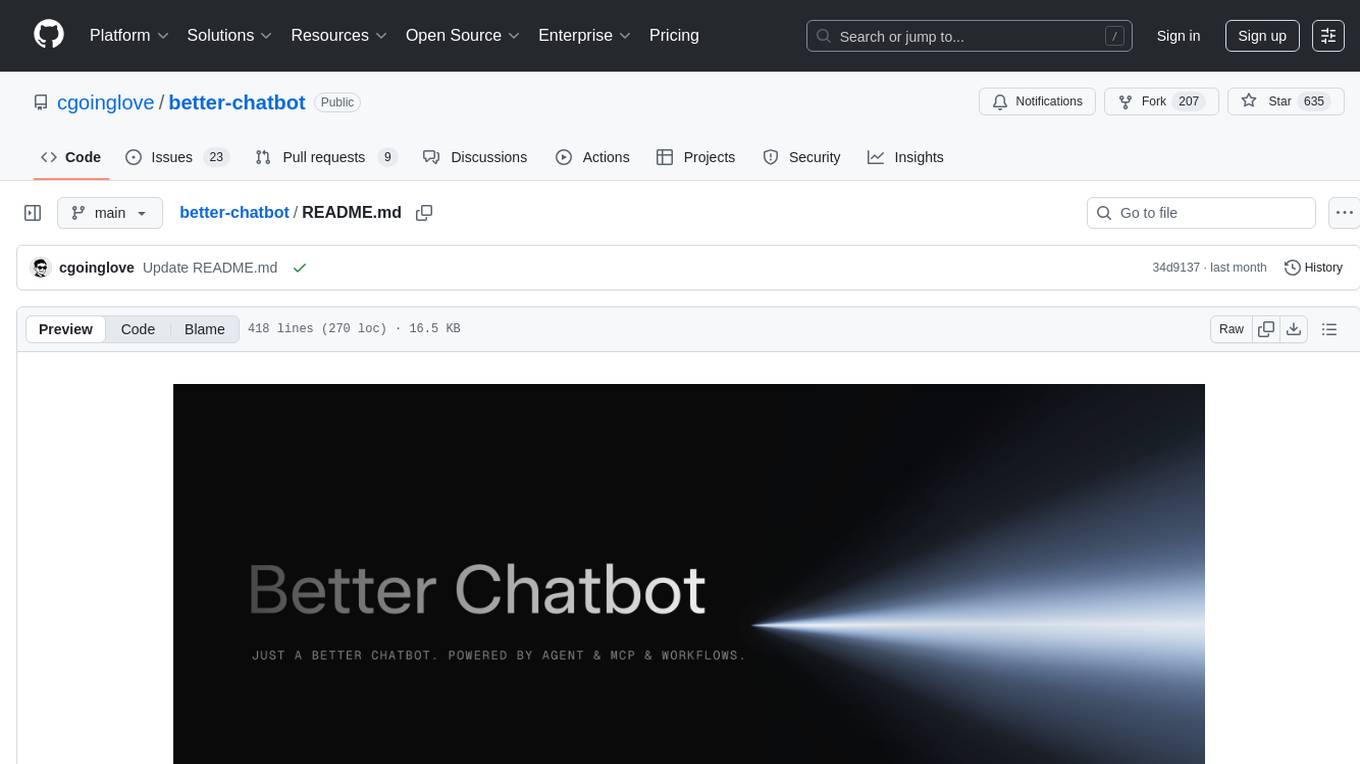
better-chatbot
Better Chatbot is an open-source AI chatbot designed for individuals and teams, inspired by various AI models. It integrates major LLMs, offers powerful tools like MCP protocol and data visualization, supports automation with custom agents and visual workflows, enables collaboration by sharing configurations, provides a voice assistant feature, and ensures an intuitive user experience. The platform is built with Vercel AI SDK and Next.js, combining leading AI services into one platform for enhanced chatbot capabilities.
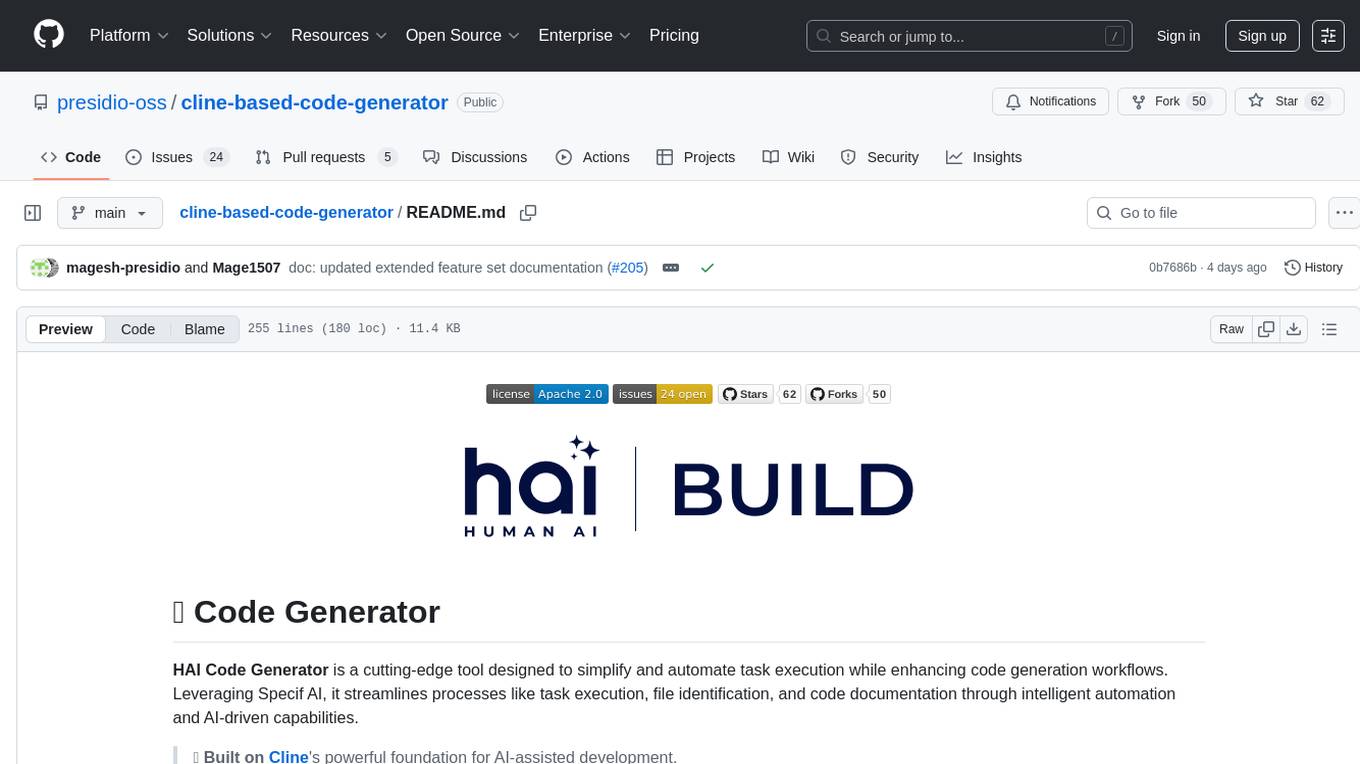
cline-based-code-generator
HAI Code Generator is a cutting-edge tool designed to simplify and automate task execution while enhancing code generation workflows. Leveraging Specif AI, it streamlines processes like task execution, file identification, and code documentation through intelligent automation and AI-driven capabilities. Built on Cline's powerful foundation for AI-assisted development, HAI Code Generator boosts productivity and precision by automating task execution and integrating file management capabilities. It combines intelligent file indexing, context generation, and LLM-driven automation to minimize manual effort and ensure task accuracy. Perfect for developers and teams aiming to enhance their workflows.
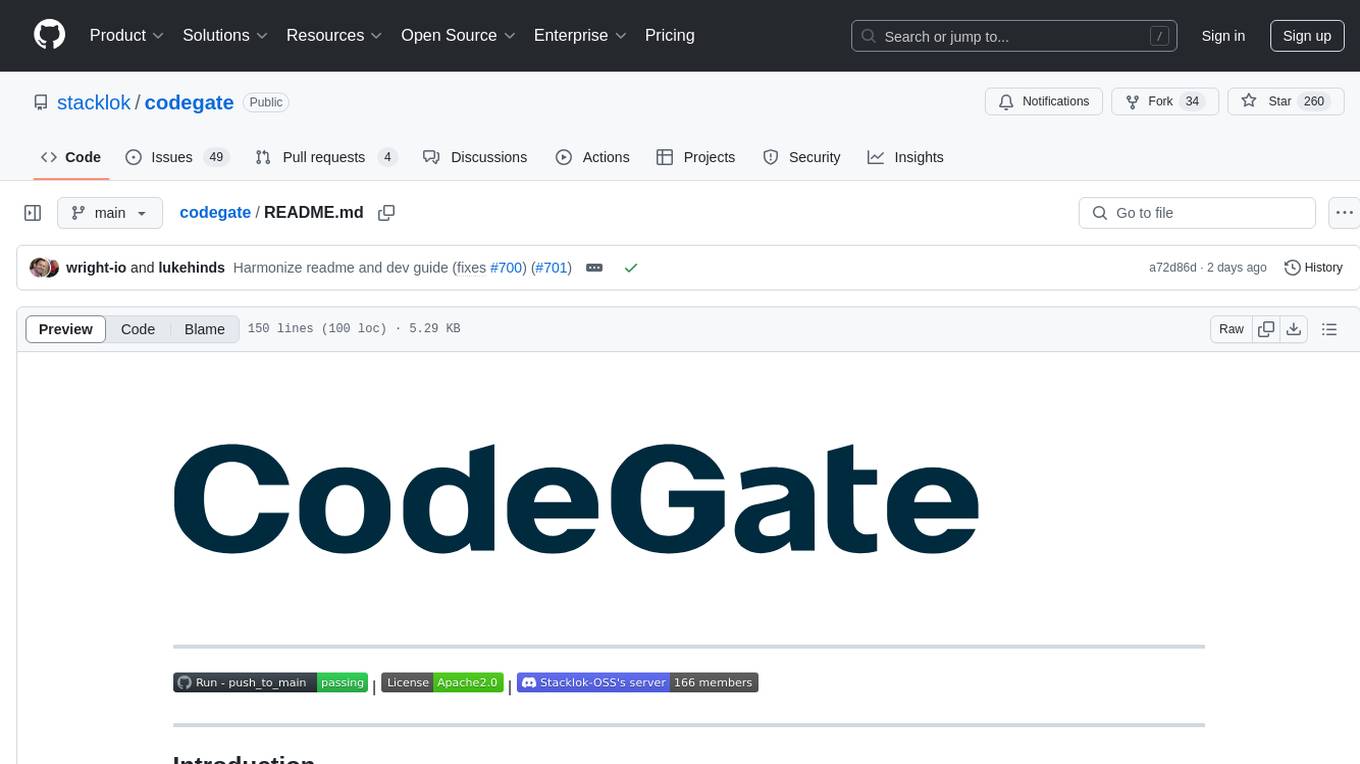
codegate
CodeGate is a local gateway that enhances the safety of AI coding assistants by ensuring AI-generated recommendations adhere to best practices, safeguarding code integrity, and protecting individual privacy. Developed by Stacklok, CodeGate allows users to confidently leverage AI in their development workflow without compromising security or productivity. It works seamlessly with coding assistants, providing real-time security analysis of AI suggestions. CodeGate is designed with privacy at its core, keeping all data on the user's machine and offering complete control over data.
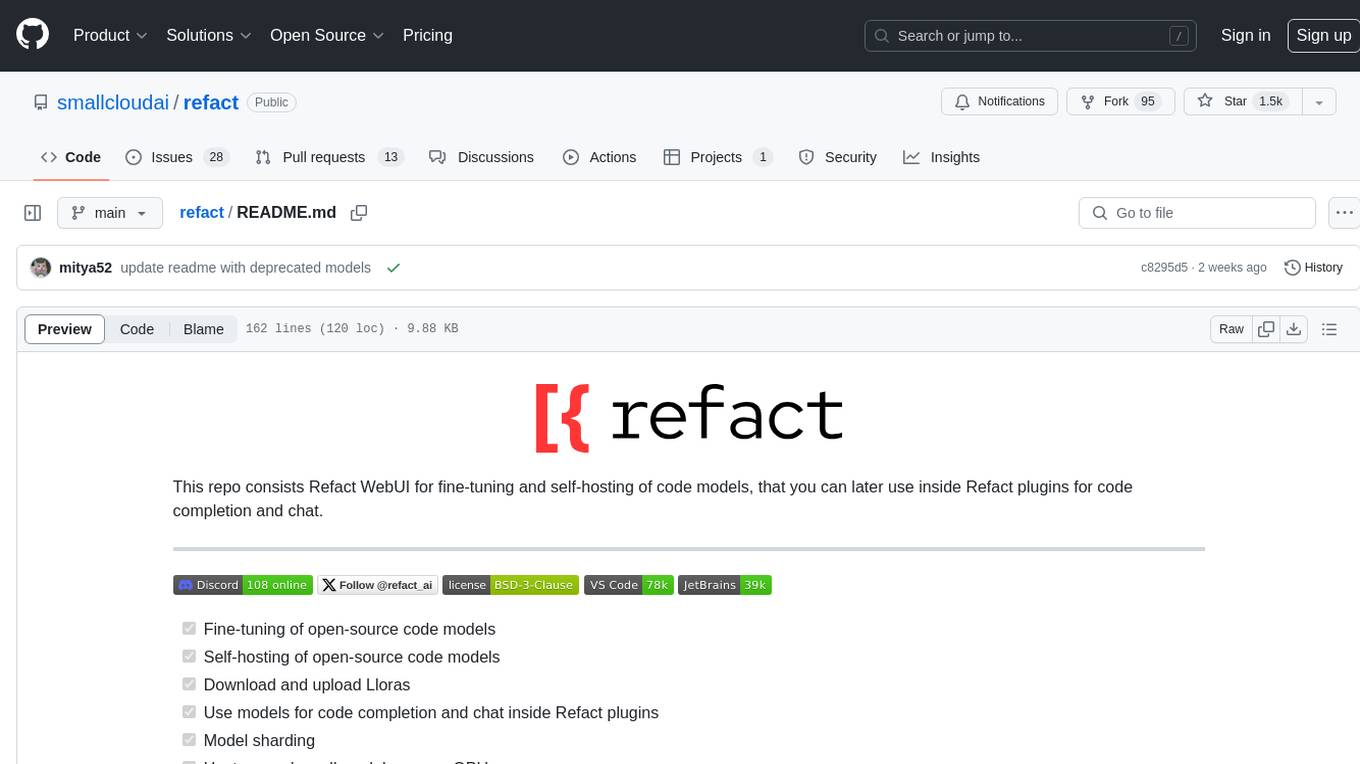
refact
This repository contains Refact WebUI for fine-tuning and self-hosting of code models, which can be used inside Refact plugins for code completion and chat. Users can fine-tune open-source code models, self-host them, download and upload Lloras, use models for code completion and chat inside Refact plugins, shard models, host multiple small models on one GPU, and connect GPT-models for chat using OpenAI and Anthropic keys. The repository provides a Docker container for running the self-hosted server and supports various models for completion, chat, and fine-tuning. Refact is free for individuals and small teams under the BSD-3-Clause license, with custom installation options available for GPU support. The community and support include contributing guidelines, GitHub issues for bugs, a community forum, Discord for chatting, and Twitter for product news and updates.
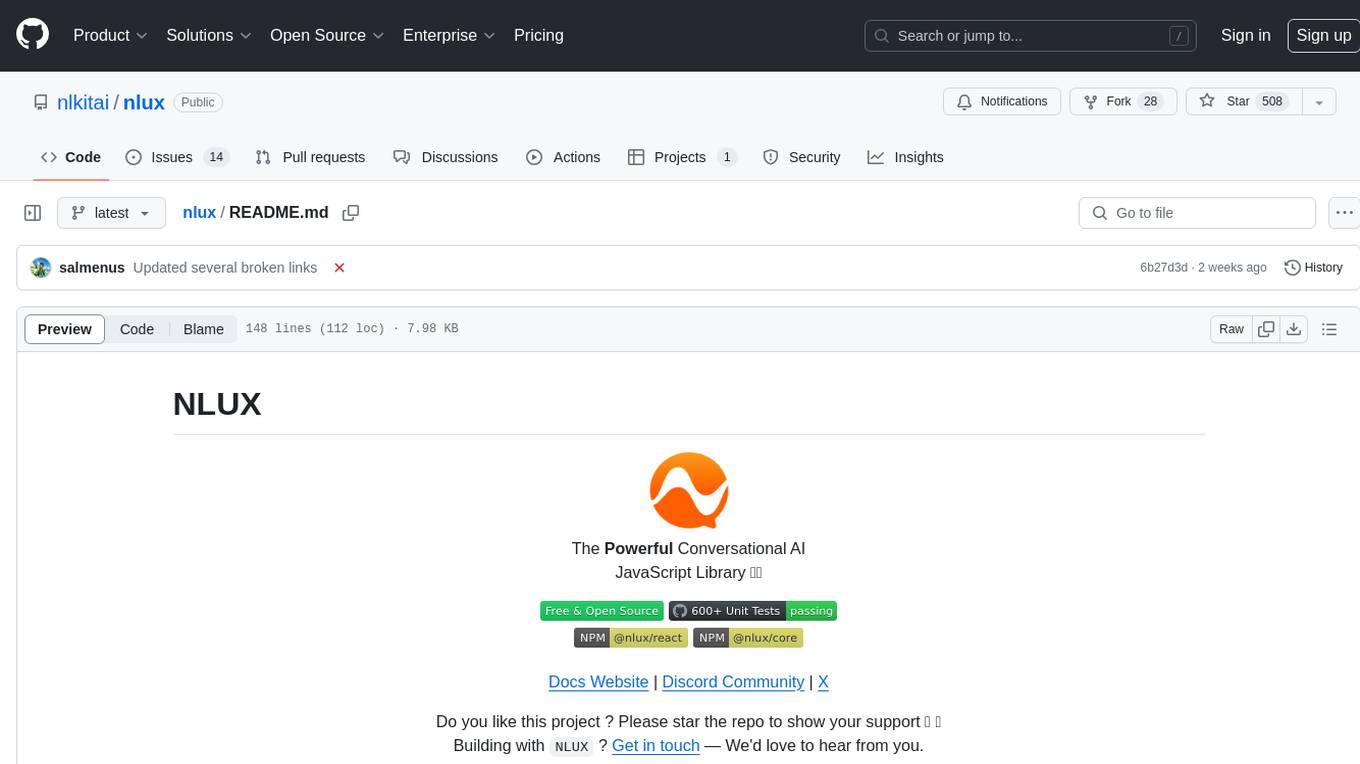
nlux
NLUX is an open-source JavaScript and React JS library that simplifies the integration of powerful large language models (LLMs) like ChatGPT into web apps or websites. With just a few lines of code, users can add conversational AI capabilities and interact with their favorite LLM. The library offers features such as building AI chat interfaces in minutes, React components and hooks for easy integration, LLM adapters for various APIs, customizable assistant and user personas, streaming LLM output, custom renderers, high customizability, and zero dependencies. NLUX is designed with principles of intuitiveness, performance, accessibility, and developer experience in mind. The mission of NLUX is to enable developers to build outstanding LLM front-ends and applications with a focus on performance and usability.
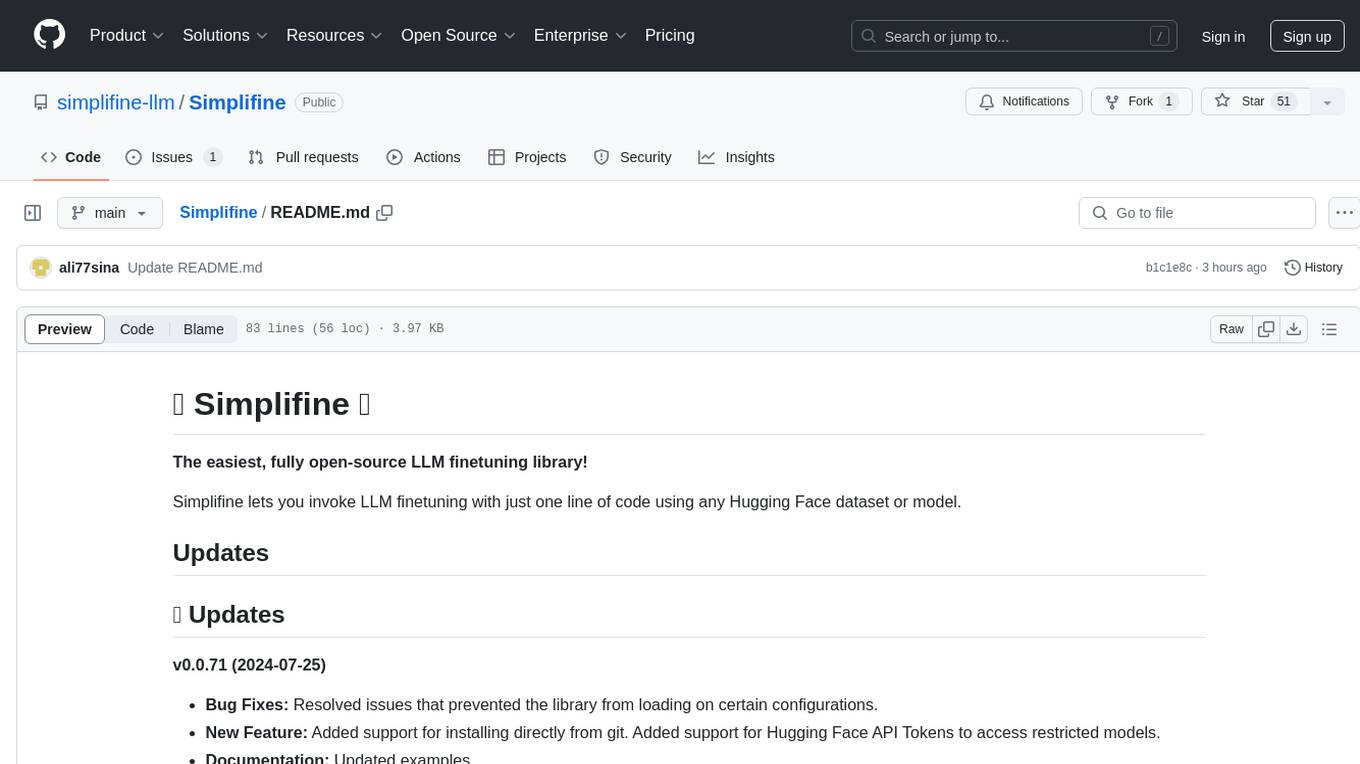
Simplifine
Simplifine is an open-source library designed for easy LLM finetuning, enabling users to perform tasks such as supervised fine tuning, question-answer finetuning, contrastive loss for embedding tasks, multi-label classification finetuning, and more. It provides features like WandB logging, in-built evaluation tools, automated finetuning parameters, and state-of-the-art optimization techniques. The library offers bug fixes, new features, and documentation updates in its latest version. Users can install Simplifine via pip or directly from GitHub. The project welcomes contributors and provides comprehensive documentation and support for users.
For similar tasks
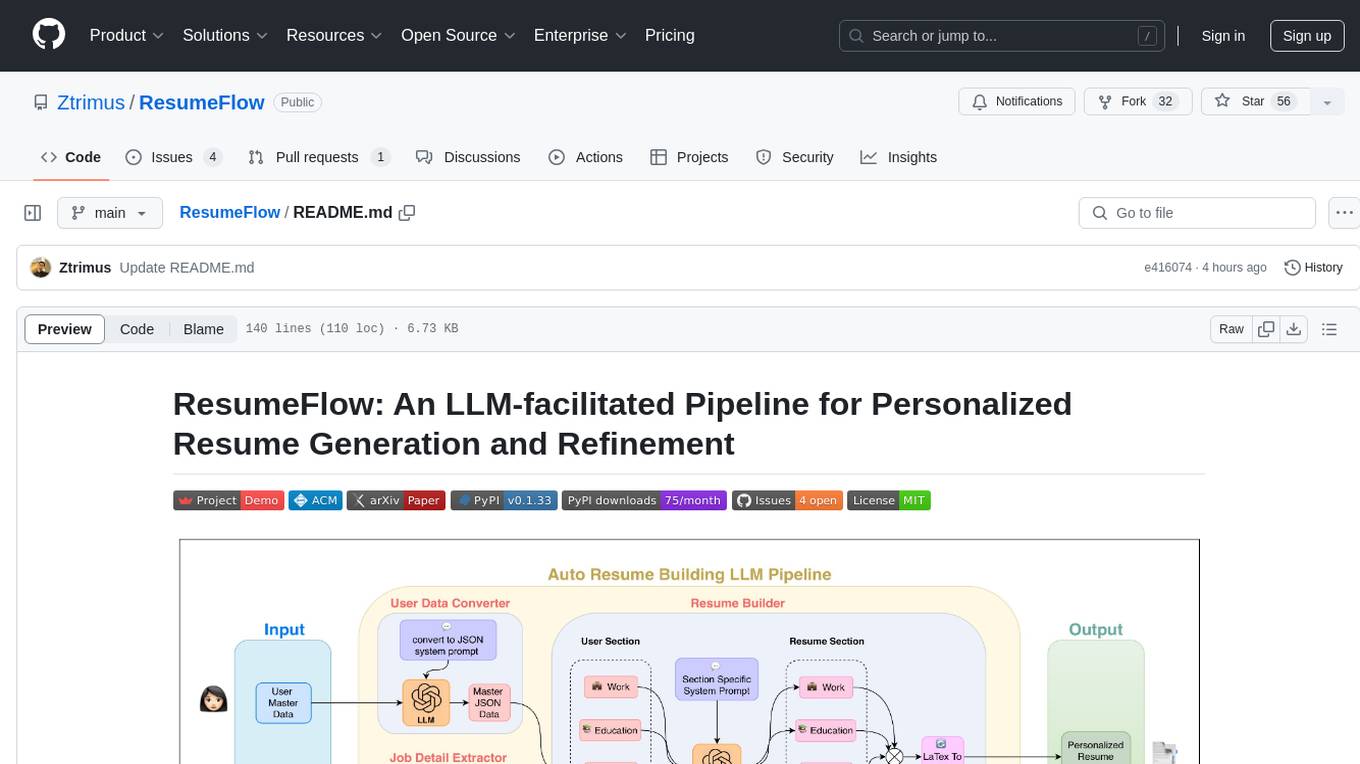
ResumeFlow
ResumeFlow is an automated system that leverages Large Language Models (LLMs) to streamline the job application process. By integrating LLM technology, the tool aims to automate various stages of job hunting, making it easier for users to apply for jobs. Users can access ResumeFlow as a web tool, install it as a Python package, or download the source code from GitHub. The tool requires Python 3.11.6 or above and an LLM API key from OpenAI or Gemini Pro for usage. ResumeFlow offers functionalities such as generating curated resumes and cover letters based on job URLs and user's master resume data.

lib_resume_builder_AIHawk
`lib_resume_builder_AIHawk` is a Python library that simplifies the creation of personalized, professional resumes by integrating with GPT models. It allows users to generate tailored resumes based on job descriptions with various styles, offering a flexible approach to resume building with minimal effort.
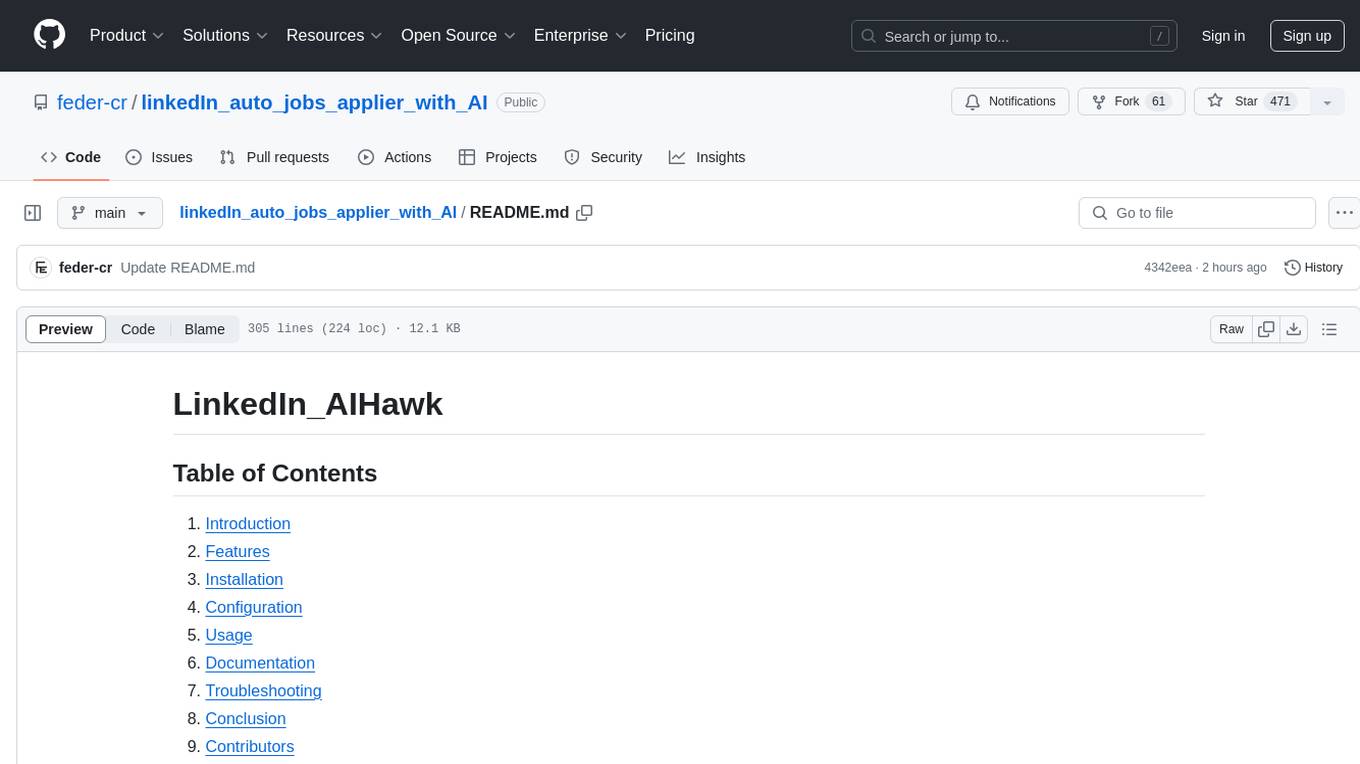
linkedIn_auto_jobs_applier_with_AI
LinkedIn_AIHawk is an automated tool designed to revolutionize the job search and application process on LinkedIn. It leverages automation and artificial intelligence to efficiently apply to relevant positions, personalize responses, manage application volume, filter listings, generate dynamic resumes, and handle sensitive information securely. The tool aims to save time, increase application relevance, and enhance job search effectiveness in today's competitive landscape.
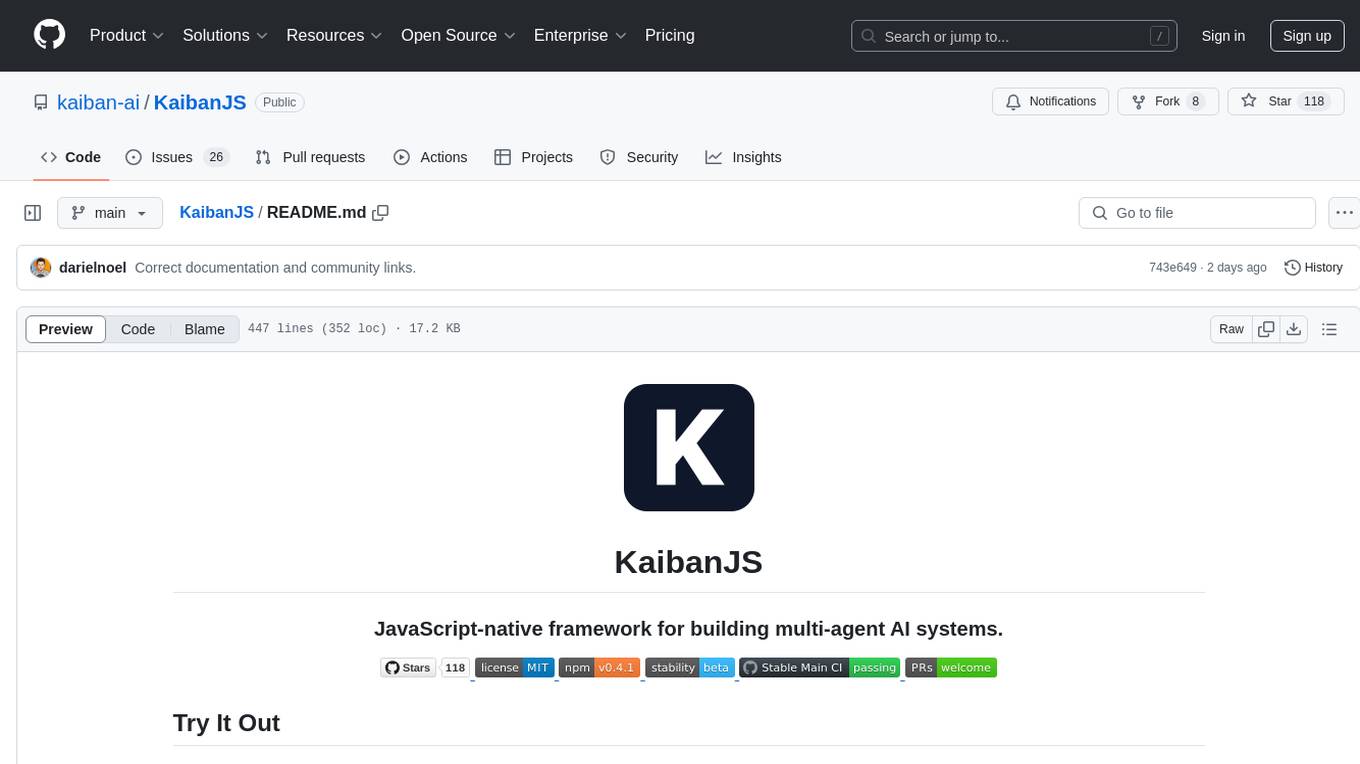
KaibanJS
KaibanJS is a JavaScript-native framework for building multi-agent AI systems. It enables users to create specialized AI agents with distinct roles and goals, manage tasks, and coordinate teams efficiently. The framework supports role-based agent design, tool integration, multiple LLMs support, robust state management, observability and monitoring features, and a real-time agentic Kanban board for visualizing AI workflows. KaibanJS aims to empower JavaScript developers with a user-friendly AI framework tailored for the JavaScript ecosystem, bridging the gap in the AI race for non-Python developers.
For similar jobs

lib_resume_builder_AIHawk
`lib_resume_builder_AIHawk` is a Python library that simplifies the creation of personalized, professional resumes by integrating with GPT models. It allows users to generate tailored resumes based on job descriptions with various styles, offering a flexible approach to resume building with minimal effort.
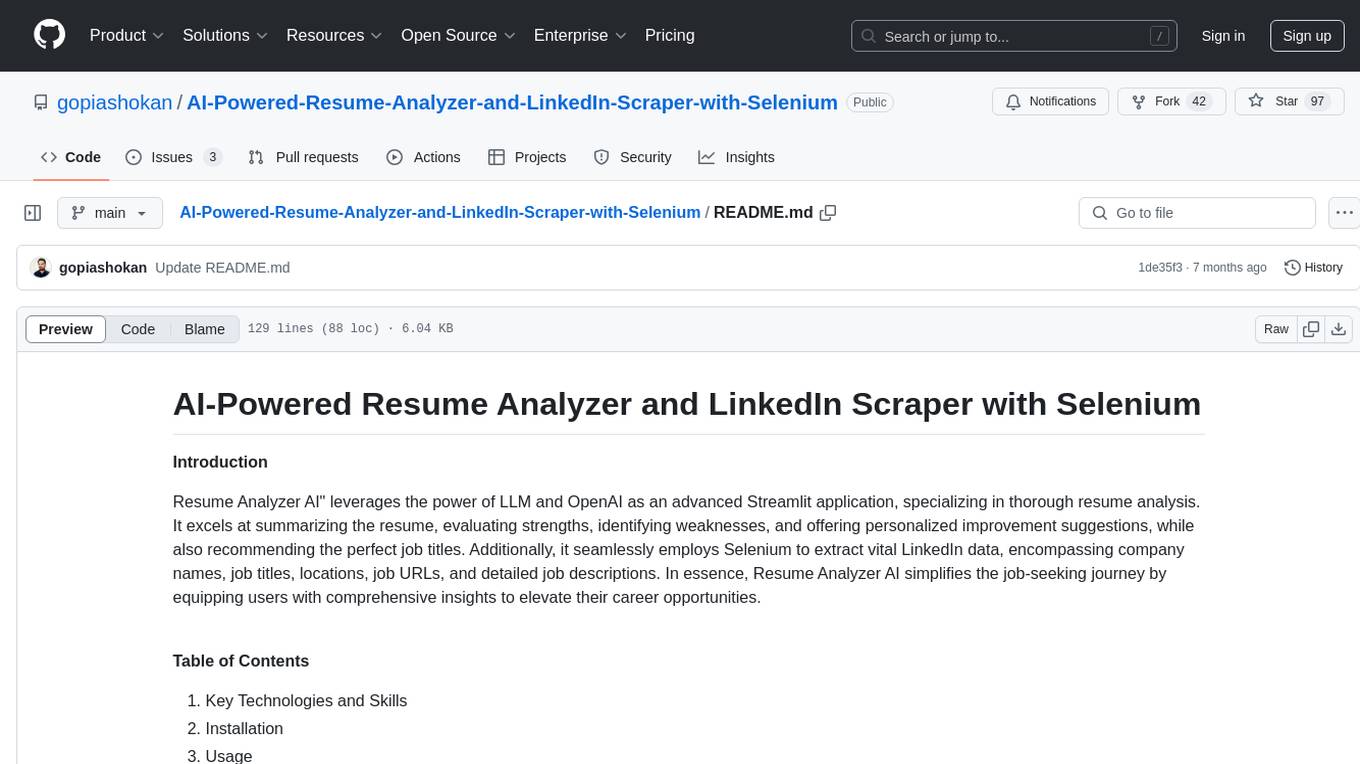
AI-Powered-Resume-Analyzer-and-LinkedIn-Scraper-with-Selenium
Resume Analyzer AI is an advanced Streamlit application that specializes in thorough resume analysis. It excels at summarizing resumes, evaluating strengths, identifying weaknesses, and offering personalized improvement suggestions. It also recommends job titles and uses Selenium to extract vital LinkedIn data. The tool simplifies the job-seeking journey by providing comprehensive insights to elevate career opportunities.
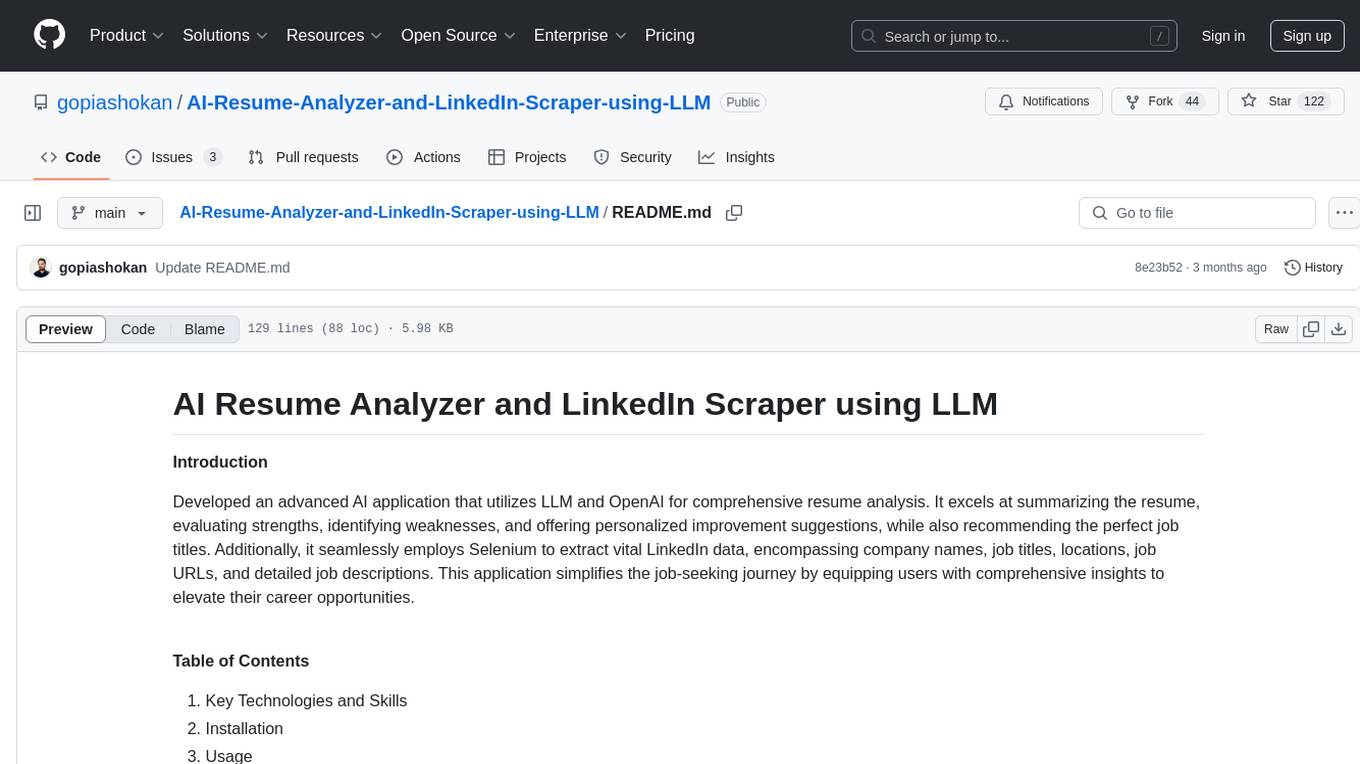
AI-Resume-Analyzer-and-LinkedIn-Scraper-using-LLM
Developed an advanced AI application that utilizes LLM and OpenAI for comprehensive resume analysis. It excels at summarizing the resume, evaluating strengths, identifying weaknesses, and offering personalized improvement suggestions, while also recommending the perfect job titles. Additionally, it seamlessly employs Selenium to extract vital LinkedIn data, encompassing company names, job titles, locations, job URLs, and detailed job descriptions. This application simplifies the job-seeking journey by equipping users with comprehensive insights to elevate their career opportunities.
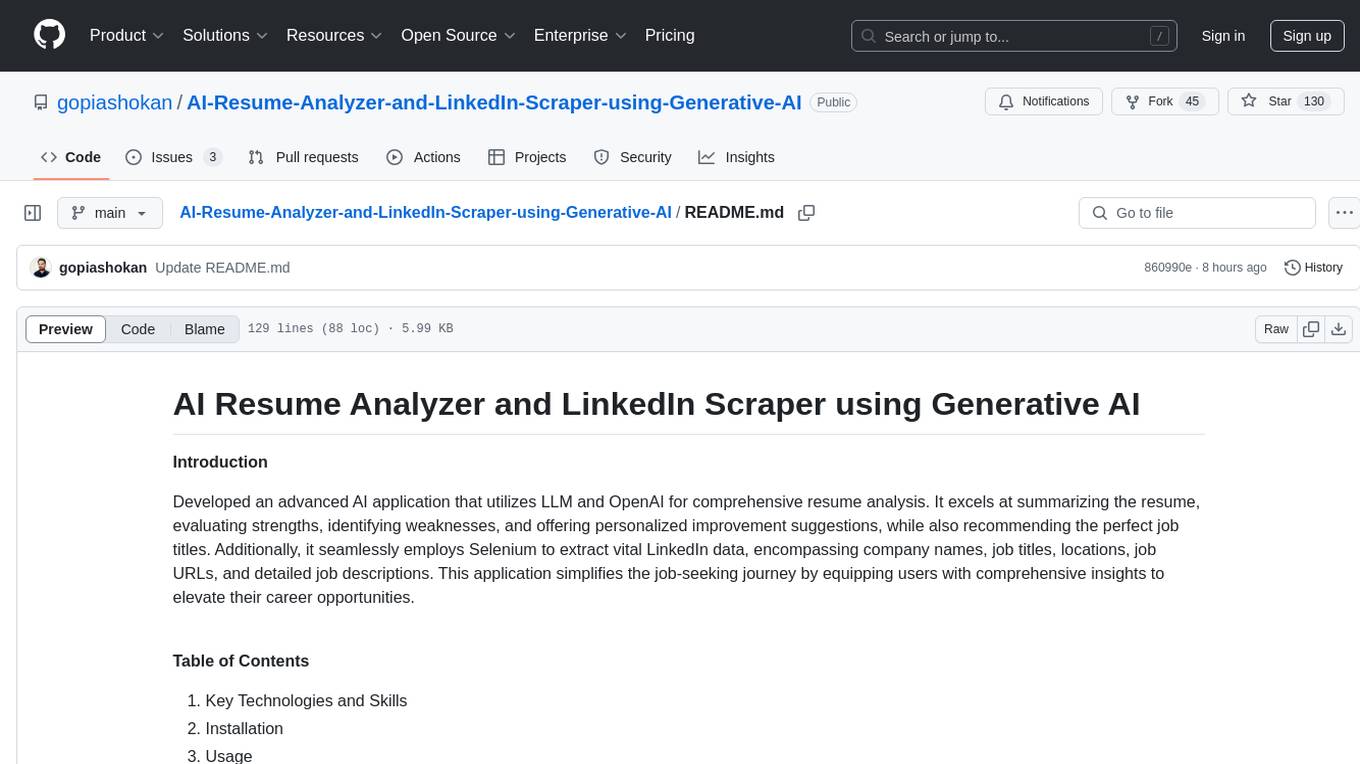
AI-Resume-Analyzer-and-LinkedIn-Scraper-using-Generative-AI
Developed an advanced AI application that utilizes LLM and OpenAI for comprehensive resume analysis. It excels at summarizing the resume, evaluating strengths, identifying weaknesses, and offering personalized improvement suggestions, while also recommending the perfect job titles. Additionally, it seamlessly employs Selenium to extract vital LinkedIn data, encompassing company names, job titles, locations, job URLs, and detailed job descriptions. This application simplifies the job-seeking journey by equipping users with comprehensive insights to elevate their career opportunities.
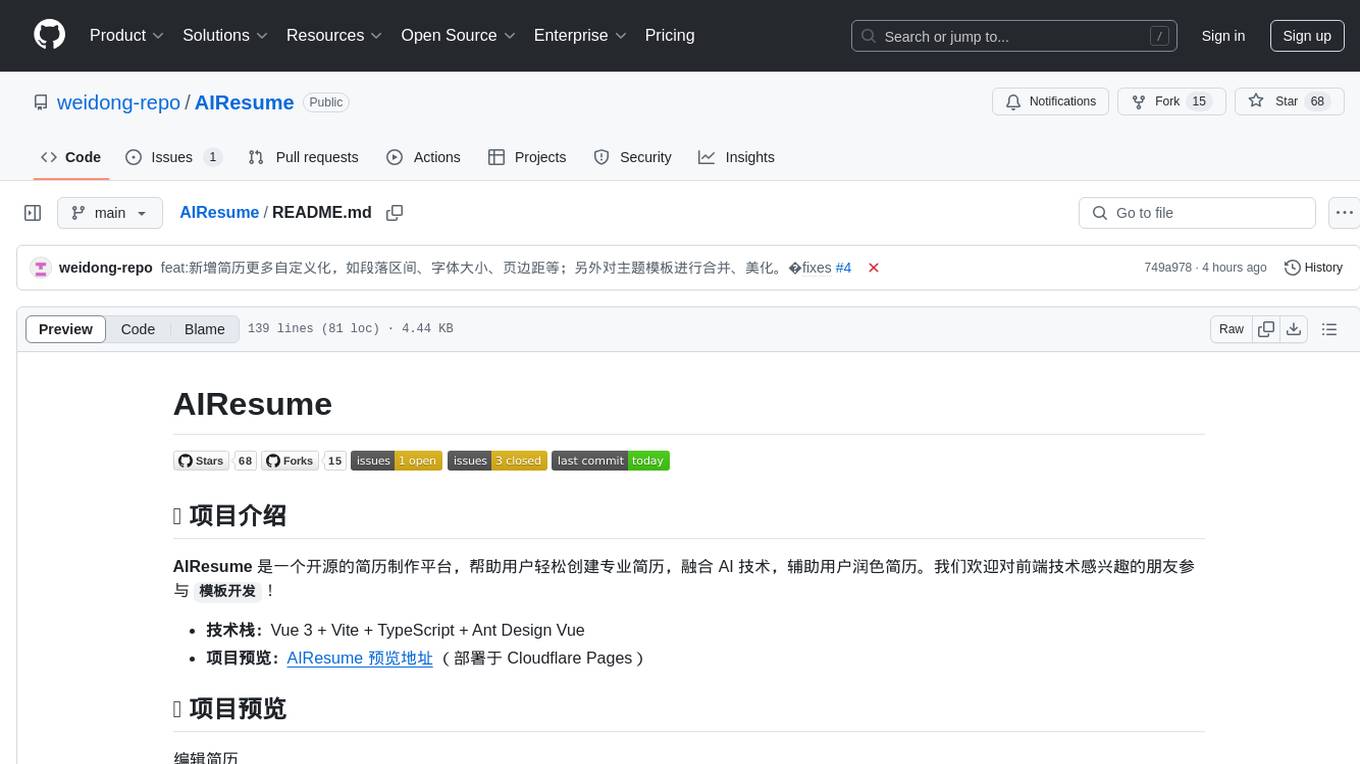
AIResume
AIResume is an open-source resume creation platform that helps users easily create professional resumes, integrating AI technology to assist users in polishing their resumes. The project allows for template development using Vue 3, Vite, TypeScript, and Ant Design Vue. Users can edit resumes, export them as PDFs, switch between multiple resume templates, and collaborate on template development. AI features include resume refinement, deep optimization based on individual projects or experiences, and simulated interviews for user practice. Additional functionalities include theme color switching, high customization options, dark/light mode switching, real-time preview, drag-and-drop resume scaling, data export/import, data clearing, sample data prefilling, template market showcasing, and more.
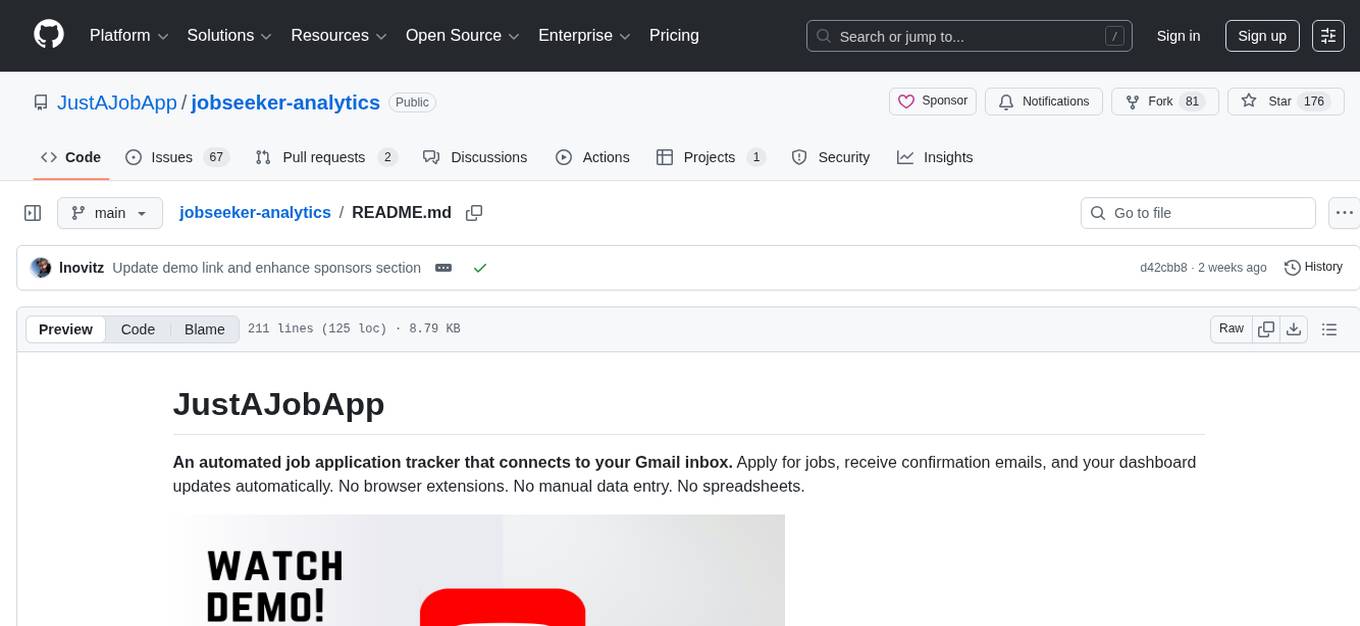
jobseeker-analytics
JustAJobApp is an automated job application tracker that connects to your Gmail inbox, allowing users to apply for jobs, receive confirmation emails, and update their dashboard automatically. It eliminates the need for browser extensions, manual data entry, and spreadsheets. The tool aims to prevent job seekers from missing opportunities due to tracking errors, increase application volume, and streamline the job search process. JustAJobApp prioritizes privacy by not reading emails, ensuring data is not for sale, and storing only necessary metadata. It is open source for public audit and offers features like interview prep and real-time visibility for career coaches.

promptflow
**Prompt flow** is a suite of development tools designed to streamline the end-to-end development cycle of LLM-based AI applications, from ideation, prototyping, testing, evaluation to production deployment and monitoring. It makes prompt engineering much easier and enables you to build LLM apps with production quality.
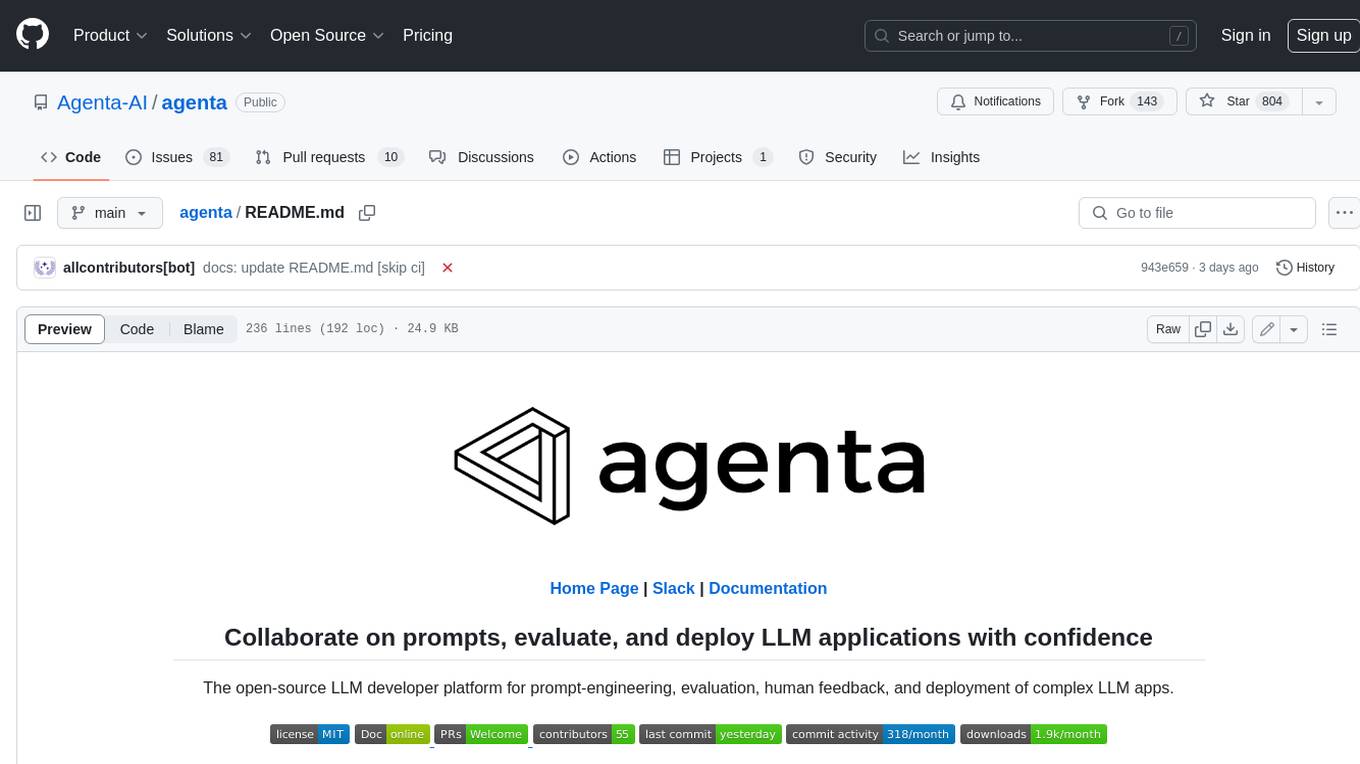
agenta
Agenta is an open-source LLM developer platform for prompt engineering, evaluation, human feedback, and deployment of complex LLM applications. It provides tools for prompt engineering and management, evaluation, human annotation, and deployment, all without imposing any restrictions on your choice of framework, library, or model. Agenta allows developers and product teams to collaborate in building production-grade LLM-powered applications in less time.